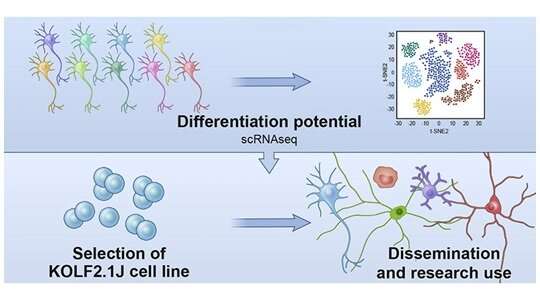This article has been reviewed according to Science X's editorial process and policies. Editors have highlighted the following attributes while ensuring the content's credibility:
fact-checked
peer-reviewed publication
trusted source
proofread
Research team establishes cell lines to improve iPSC research

Induced Pluripotent Stem Cell (iPSC) lines have become essential for determining the underlying genetic drivers of human disease. Genomes of iPSCs can be easily edited using the bacteria-based CRISPR/Cas9 technology to introduce or correct disease-associated variants.
Through a focus on one gene variation at a time, results of experiments yield a clear genetic cause and effect that can be easily compared to previous data. What poses a challenge for accurate disease modeling is the inherent variation between iPSC lines, as well as the wide variety of cell lines used in research between institutions, creating unwanted obstacles in data interpretation.
Jackson Laboratory (JAX) Professor of Cellular Engineering Bill Skarnes, Ph.D., and colleagues have developed a cell line to address the challenges facing cellular modeling of disease. The study, published in Cell Stem Cell, details genetic properties characterization of eight iPSC lines, with one rising above the rest.
The cell line KOLF2.1J has proven to be an all-around well-performing iPSC line with high genomic stability in post-edited clones. Meeting all the criteria for cellular engineering research, KOLF2.1J can act as a stable foundation for modeling hundreds of genetic alterations relevant to Alzheimer's disease, rare disease, cancer, and more.
KOLF2.1J is available as both a reference parental line and with selected single nucleotide variants (SNVs) as part of the catalog of human iPSCs at JAX.
By selecting KOLF2.1J as a cell line of choice, researchers will be able to generate consistent, integrated data and help accelerate human disease research. In collaboration with UConn Health, Skarnes and fellow JAX researchers are now planning to derive additional similarly well-characterized iPSC lines from healthy individuals of diverse genetic backgrounds.
More information: Caroline B. Pantazis et al, A reference human induced pluripotent stem cell line for large-scale collaborative studies, Cell Stem Cell (2022). DOI: 10.1016/j.stem.2022.11.004
Journal information: Cell Stem Cell
Provided by Jackson Laboratory



















